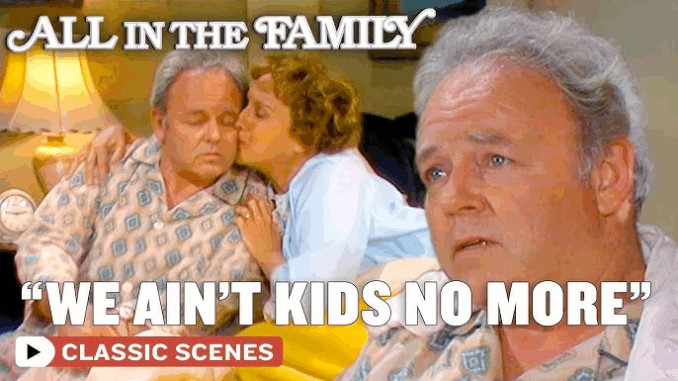
In the realm of television, few shows have had the cultural impact of All in the Family. A show that pushed boundaries, sparked controversy, and redefined what a sitcom could be, it remains one of the most influential TV shows of all time. Airing from 1971 to 1979, All in the Family was much more than a collection of jokes and slapstick humor—it was a revolutionary approach to storytelling that tackled America’s most pressing social issues head-on.
The series was centered around Archie Bunker, a working-class man with deeply ingrained conservative beliefs, which were often outdated and offensive. Archie’s unapologetic bigotry and frequent clashes with his family members, especially his liberal son-in-law Mike, formed the crux of the show’s social commentary. In the 1970s, a time of rapid social change, All in the Family held up a mirror to the polarized nature of American society. The show’s ability to explore sensitive subjects—such as racism, sexism, and the generational divide—was groundbreaking for its time, making it an incredibly bold choice for a mainstream sitcom.
At its core, All in the Family was a clash of ideologies. Archie represented the old guard, clinging to antiquated ideas of what America should look like. Meanwhile, his daughter Gloria and her husband Mike symbolized the younger generation’s desire for progress and social reform. The show didn’t just rely on satire; it showed that these conflicting viewpoints were more than just fodder for humor—they were reflective of real societal tensions. Through its clever writing and strong performances, All in the Family made it impossible for viewers to ignore the uncomfortable truths being presented.
What set All in the Family apart from other sitcoms of the time was its rawness. It wasn’t afraid to offend, to show characters in their most unflattering light, or to depict situations that were far from neat or resolved. In fact, much of the humor in the show stemmed from the awkwardness and discomfort of the characters’ interactions. Archie’s frequent tirades about race and politics weren’t just the source of humor; they acted as a vehicle for critical discussion about the social and political realities of 1970s America.
The show’s impact went far beyond its initial broadcast run. All in the Family was groundbreaking in its ability to bring taboo topics into the living rooms of American households. It forced audiences to question their own beliefs and confront the racism, sexism, and inequality that were often overlooked or glossed over in mainstream media at the time. But perhaps most importantly, All in the Family opened the door for more shows to tackle serious social issues. Its success proved that television could be both entertaining and socially relevant, something that had previously been a rarity.
Even after decades, the legacy of All in the Family continues to resonate in popular culture. Its impact is felt in modern sitcoms like The Simpsons, Family Guy, and Roseanne, all of which blend humor with social commentary. The show also paved the way for more diverse representation in television, challenging stereotypes and making space for voices that had been previously marginalized.
In the end, All in the Family was not just a show about a family. It was a show about America, its struggles, its contradictions, and its capacity for change. By pushing the boundaries of what television could portray, All in the Family helped to reshape the medium, proving that television could be a powerful tool for social commentary and cultural reflection. Its influence is undeniable, and its place in TV history remains secure as one of the most significant and daring shows ever to hit the airwaves.
